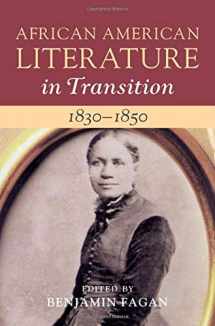
African American Literature in Transition, 1830–1850: Volume 3
Book details
Summary
Description
This volume charts the ways in which African American literature fosters transitions between material cultures and contexts from 1830 to 1850, and showcases work that explores how African American literature and lived experiences shaped one another. Chapters focus on the interplay between pivotal political and social events, including emancipation in the West Indies, the Irish Famine, and the Fugitive Slave Act, and key African American cultural productions, such as the poetry of Frances Ellen Watkins Harper, the writings of David Walker, and the genre of the Slave Narrative. Chapters also examine the relationship between African American literature and a variety of institutions including, the press, and the post office. The chapters are grouped together in three sections, each of which is focused on transitions within a particular geographic scale: the local, the national, and the transnational. Taken together, they offer a crucial account of how African Americans used the written word to respond to and drive the events and institutions of the 1830s, 1840s, and beyond.


We would LOVE it if you could help us and other readers by reviewing the book
Book review



